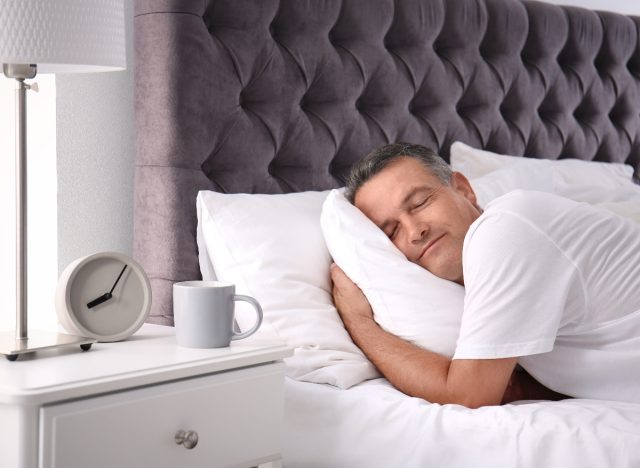According to psychologists, chronic insomnia can place you at risk. Not getting enough shuteye can do so much more than make you feel super tired—it can compromise your judgment and reaction time, make you cranky and impulsive, and even result in ADD-like symptoms. These sleep-deprived reactions are also related to casualties such as motor vehicle accidents, employment terminations, and even suicide. Insomnia ranges from somewhat mild to a chronic condition.
We spoke with Brad Rosenfield, Psy.D., M.S., Associate Professor, Philadelphia College of Osteopathic Medicine to learn more about the inability to sleep. Dr. Rosenfield explains there’s a correlation between insomnia and different psychological conditions, including anxiety, depression, substance abuse, and bipolar disorder. Not only that, but being deprived of necessary sleep can cause moodiness, which in turn can create anxiety in a relationship and even divorce.
According to Dr. Rosenfield, medical research has proved that insomnia over a long period greatly increases the risk of stroke, cardiovascular disease, hypertension, diabetes, dementia, high cholesterol, and even early death. He tells us, “Sleep allows our bodies to activate wonderfully complex rejuvenating systems, which come alive when we sleep and are necessary for the health of all of our organs, including brain, heart, pancreas, and hormonal systems, to name a few.”
Read on to learn ways to manage chronic insomnia, and next, be sure to check out The 6 Best Exercises for Strong and Toned Arms in 2022, Trainer Says.


It’s important to pamper yourself and do what you need to do to get enough Z’s. Dr. Rosenfield says, “Our bodies have an intricate stabilizing balance system or homeostasis. For example, when we sleep, the stress hormone cortisol is reduced. Interestingly, as we approach morning, cortisol and testosterone increase to prepare us to wake and attack the day.” He also notes there’s a chemical called BDNF which your brain produces. BDNF is responsible for your long-term memory—it’s what connects brain cells and neurogenesis (new brain cell production).
Dr. Rosenfield adds, “Appetite suppressing leptin increases and munchies stimulating ghrelin is reduced. Sleep also helps to regulate insulin, which has important implications for diabetes.”
Lots of good (and necessary) things happen when you sleep. Your body produces “depression-fighting and brain-protecting serotonin, norepinephrine, and dopamine increase.”
Related: This Portable Infrared Sauna Turned Me Into a Great Sleeper


There are many causes of insomnia, including stress, anxiety, and depression. Other culprits are caffeine late in the day and at night. This includes tea, coffee, chocolate, and energy drinks. These products can keep you seriously wired for as much as four to eight hours and longer, impeding sleep time, Dr. Rosenfield explains.
More things to avoid? Stay away from technology screens, video games, odd work shifts, jet lag, and neighborhood noise.
READ RELATED: I'm a Doctor and Beg You Stop Making This "Deadly" Mistake
Related: Bad Sleeping Habits That Could Lead To Weight Gain, Expert Says


We have some great suggestions from Dr. Rosenfield to step up your bedtime routine. What works for each individual will differ, but his first step is to “find a good sleep routine and stick to it, through the week and into the weekend.” He continues, “As Dr. Michael Perlis wisely advises: If you can do one thing, wake at the same time every day.” By doing this, your body will at some point adjust. In addition, you should avoid any naps during the day. Sticking with these tips will amp up your sleep drive, making you more inducive to getting some shut-eye at bedtime. The goal is to achieve seven to eight hours of solid sleep, Dr. Rosenfield explains.
Some individuals find it relaxing to take a light walk, stretch, do some yoga, or read a good book. “A warm bath at night can help because the subsequent declining body temperature can help to induce sleep,” Dr. Rosenfield explains, adding, “Schedule ‘worry time’ in the day, not at night. Try to get as close to 30 minutes or more of good exercise during the day as you can.”


Another great habit to adopt is limiting your bedroom for cuddling and sleeping. Make it off-limits to eating, fighting, and watching TV.
Dr. Rosenfield also recommends “avoiding stimulating activities at night can help, including a tech curfew two hours prior to target sleep time. Tech screens produce bluewave light, which interferes with melatonin production. Although bluewave light filters exist, smartphone and computer activity can be very stimulating to most people.”


It’s always good sense to make sure you go for your regular check-ups with your medical professional, and don’t hesitate to consider therapy sessions. Professionals always provide the opportunity to address any sleep difficulties.
Dr. Rosenfield explains, “A good clinician wants to know if you are distressed, impaired, fatigued, falling asleep at inappropriate times and places, or have any interesting or unusual sleep behavior. These behaviors include insomnia, loud snoring, gasping for air, jerking legs or arms, grinding teeth, sleepwalking, and nightmares, which may indicate other specific sleep disorders.”
Another consideration is behavioral treatments, like cognitive behavioral therapy for insomnia (CBT-I) and also medication possibilities. Finding the right treatment that’s effective is instrumental in helping you feel your absolute best.
Source:










